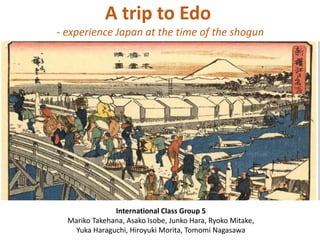Asadai (Morning University) Producing Japan Class Presentation
- 1. A trip to Edo - experience Japan at the time of the shogun International Class Group 5 Mariko Takehana, Asako Isobe, Junko Hara, Ryoko Mitake, Yuka Haraguchi, Hiroyuki Morita, Tomomi Nagasawa
- 3. Target: Non ¨CJapanese people who are interested in Japanese history and traditional culture
- 5. Day 1: Go on a trip ¨C One of Edo¡¯s Entertainments
- 6. Day 2: Feel Samurai ¨C Representative class of Edo
- 7. Day 3: See Daily Life of Edo people ¨C Edo spots associated with Tokugawa
- 8. Detailed Plan: Day 1 Go on a trip - One of Edo¡¯s Entertainments
- 9. Trip along with Nakasendo Route: Kiso ¨C Nakasendo - Tsumago-juku 7:00 Move from Tokyo Station to Kiso (Bus)
- 10. 11:00 Kiso Kurashi no Kogeikan (Lacquerware) Kiso Lacquerware (Shikki), using different colors of lacquer, became popular in Edo period. 12:00 Lunch @ Yoshida (next to the Kogeikan)
- 11. 14:00 Nakasendo Hiking (1.5 hours) A quiet portion of the original highway has been preserved between Tsumago and Magome, providing a pleasant walk and feelings of Edo period
- 12. 16:00 Tsumago-juku Walking (free time) Tsumago-juku (ÆÞ»\ËÞ) was the 42nd of the 69 post towns(ËÞˆöî® Shukuba-machi) on the Nakasend¨, and still has many historic sites and buildings.
- 13. 18:00 Fujito Ryokan (Japanese Omotenashi Inn) Fujioto is a traditional inn located in Tsumago, surrounded by Japanese style gardens, serving local cuisine from the time of Samurai and Shogun.
- 14. Detailed Plan: Day 2 Feel Samurai - Representative class of Edo
- 15. 10:30 Matsumoto Castle Matsumoto Castle is one of four castles designated as 'National Treasures of Japan' and the oldest castle donjon remaining in Japan.
- 16. 12:30 Nakamachi Street (lunch & Shopping) The street is lined by nicely preserved warehouse-type buildings (Kura) with massive, white painted walls, a characteristics of former merchant districts.
- 17. 18:00 Dinner @ Asakusa Ichimon (Edo Negima-Nabe) Negima-Nabe(pot) is a popular food for ordinary people in Edo. Main ingredient of this food is leeks and fat tuna.
- 18. 19:30 Sawanoya (Japanese omotenashi inn) Sawanoya located in ¡°Shitamachi¡± of Tokyo where the traditional folksy life style is still preserved.
- 19. Detailed Plan: Day 3 See Daily Life of Edo people - Edo spots associated with Tokugawa
- 20. 8:00 Visiting Sumo Training @ Tokasago Stable Sumo, a Japanese style of wrestling, became entertainment for ordinary people in the Edo period.
- 21. 10:00 Edo-Tokyo Museum The permanent exhibit showcases politics, culture, and an insight into the lifestyle of the people in Edo period.
- 22. 12:00 Lunch @ Kappo Yoshida (Chanko-Nabe) Chanko-Nabe(pot) is the staple food of sumo wrestler. It is a hot pot dish and contains fishes, meats and vegetables.
- 23. 13:30 Kanda Myojin Shrine Kanda Myojin Shrine was built in ¡°Kimon¡± , unlucky direction of Edo castle, for protecting Tokygawa family and people in Edo from disaster.
- 24. 14:40 Kanda-no-Ie The house restores a valuable work of architecture that reflects the pre-war shop style as well as the traditional architectural technologies of the Edo period
- 25. 16:00 Imperial Palace (former site of Edo Castle) The Imperial Palace with its grounds is located on the site of the former residential palace of the successive Tokugawa Shoguns in the Edo Period.
- 26. Travel Firework Edo¡¯s Entertainments You can find them out more! Yoshiwara Performance


























